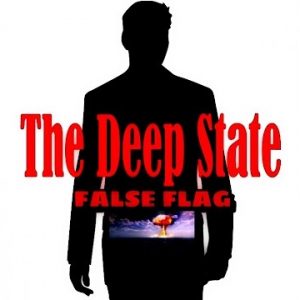
US Intelligence Warns of Russian False Flag to Provoke Invasion of Ukraine
Keep up to Date & Bypass the Big Tech Censorship
Get uncensored news and updates, subscribe to our daily FREE newsletter!
Does this make the intelligence agencies conspiracy theorists?
As far as diplomacy with Russia goes, citing anonymous sources has never stopped the US from increasing hostilities between the two nations. Whether it’s to impeach a president, impose sanctions, or to enforce a larger military presence on its border, the breadth of instances using unfounded assertions made by the US-EU axis for those purposes has become innumerable. In its latest iteration of this, US intelligence sources are increasing the already strained relationship with Russia by tacitly acknowledging a tactic which it has decried as a figment of “conspiracy theorist’s” imaginations any time they have faced similar accusations.
.@PentagonPresSec: "We do have information that indicates that Russia is already working actively to create a pretext for a potential invasion. […] We have information that they've prepositioned a group of operatives to conduct what we call a false flag operation." pic.twitter.com/MvSmF6fgQo
Recommended Books [ see all ]
— The Hill (@thehill) January 14, 2022
Citing the familiar source of an unnamed US official, National Security Advisor Jake Sullivan remarked that leaks conveyed the Russian government is on the precipice of launching a false flag as a pretext to invade Ukraine. White House Press Secretary Jen Psaki expounded upon the revelations made by Sullivan, stating that Russian operations were attempting to “fabricate Ukrainian provocations in state and social media to justify a Russian intervention.” The anonymous source stated that the clandestine fabrication of a cause for war would be conducted by covert Russian operatives in the Donbass region of eastern Ukraine that has become the formative battleground between NATO and the Kremlin.
Ironically, this announcement preceded a widespread hack of Ukrainian government websites that has already and unsurprisingly been accused of being a Russian cyber warfare attack. Accordingly, Secretary General Jens Stoltenberg expressed that NATO would expedite its efforts to further ingratiate Ukraine into its axis. Though talks of full-fledged membership have not been taken back up, Stoltenberg stated that “In the coming days, NATO and Ukraine will sign an agreement on enhanced cyber cooperation, including Ukrainian access to NATO’s malware information sharing platform[.]” He would go on to offer insight into the current state of the partnership between Kiev and NATO, saying “NATO has worked closely with Ukraine for years to help boost its cyber defenses. NATO cyber experts in Brussels have been exchanging information with their Ukrainian counterparts on the current malicious cyber activities[.]”
Curiously, Russian government officials also broke news regarding the landscape of cyber crime operations already occurring within its borders. Russia’s Federal Security Service (“FSB”) announced that it defeated a hacking group named REvil. That hacking group was behind a US software firm, leading to increased calls from Washington for Russia to stop this criminal activity. This point of discussion was a prominent part of discussions between US President Joe Biden and his Russian counterpart Vladimir Putin.
Russian FSB officials conveyed that this initiative was taken at the behest of US authorities. The FSB effort seized over 425 million rubles, the equivalent of 5.5 million dollars/4.8 millions euros. Despite the apparent cooperation of the US and Russia in this cyber warfare countermeasure, any veneer of reconciliation between the two nations is sure to be shattered following the hack of Ukrainian government IT infrastructure.
Perhaps Jake Sullivan doth protest too much and the allegations of Russian-backed cyber efforts being behind the Ukraine hack are a false flag effort on behalf of Nato and its interests in and of themselves. As the US Senate battles to circumvent a filibuster preventing the imposition of sanctions against the Nordstream 2 pipeline, stoking the once-fervent fires of anti-Russian sentiment could be a valuable tool in overcoming that hurdle.
While an act of cyber warfare could be contrived as casus belli, the appearance of covert military operations in the Donbass surely carries more weight. Eastern Ukraine has become the proverbial Berlin Wall of the Neo-Cold War. In recent months, Russian forces have conducted drills along its border with Ukraine. Those exercises have been characterized as a provocation of war, although that military presence of approximately 175,000 troops was removed from the region following their withdrawal in the final weeks of 2021. In the time since that de-escalation, NATO has begun approaching Russian territories in the Arctic, freezing any sense of tension between the two thawing.
That withdrawal followed calls from Putin to guarantee that NATO would not expand itself further toward Russia’s borders. In recent vintage, the premise of Georgia joining NATO has also become a contentious point between Russia and the US. During the confirmation hearing of current US Secretary of State Anthony Blinken, Senator Rand Paul contextualized the gravity of the ramifications that would follow any such agreement by stumping the then-nominee as to whether or not it would constitute an act of war against Russia under current international law.
Both the hack on Ukrainian government websites and the purported military intel warning of a Russian false flag come following the end of meetings with NATO. Admiral Rob Bauer characterized the diplomatic effort as largely inconsequential. Russian Foreign Minister Serbey Lavrov took a much more ominous tenor, state ““We have run out of patience…the West has been driven by hubris and has exacerbated tensions in violation of its obligations and common sense.” With the mounting news of Russian hostilities one again taking center stage, US officials risk their allegations being the straw that breaks the camel’s back. If push does come to shove, the Donbass will assuredly be the theater that stages that tragedy.







